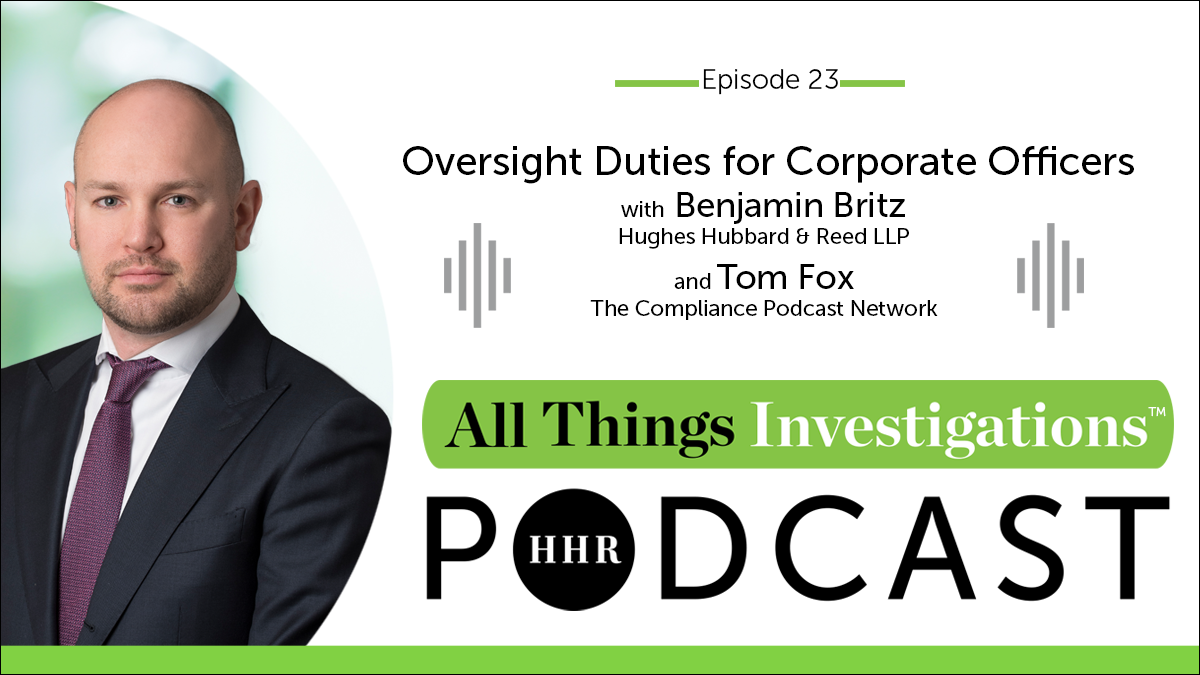
In this episode of All Things Investigations, host Tom Fox talks with Benjamin Britz, partner at Hughes Hubbard, about the recent Delaware Court of Chancery decision regarding the NRA McDonald’s case. Ben explains the court system in Delaware and the background facts of the case involving sexual misconduct and harassment allegations against McDonald’s CEO and his Chief People Officer, David Fairhurst. The court’s decision focuses on whether Fairhurst had an oversight duty as an officer, and Ben and Tom discuss the legal rationale for the duty of oversight and the duty of information and compliance information systems.
Benjamin Britz is a partner at the law firm Hughes Hubbard and has extensive experience in internal investigations, securities litigation, and white-collar defense. He graduated from Columbia Law School in 2004 and went on to clerk for Judge Jim Carr in the Northern District of Ohio before joining Hughes Hubbard. He has remained with the firm ever since.
You’ll hear Tom and Ben discuss:
- The Delaware Court of Chancery is a specialized forum for disputes regarding the operations and governance of Delaware corporations, and it has very knowledgeable judges who are confirmed by the Delaware State Senate.
- The duty of oversight applies to corporate officers and is based on the same fiduciary duties as directors.
- The duty of oversight includes the duty of information and compliance information systems, as well as the duty of red flag, where officers need to take action if they become aware of misconduct.
- The court’s decision in this case was based on the duty of red flag and a finding of bad faith due to inaction on the part of Fairhurst, who ignored red flags and was allegedly engaged in misconduct himself.
- The court’s opinion was comprehensive, possibly to ensure a basis for upholding the decision on appeal, and the duty of oversight applies to the chief compliance officer as well.
- The court’s decision in the case discussed does not extend beyond corporate officers. The decision does, however, elevate the role of the chief compliance officer to the level of the CEO or CFO in terms of the breadth of their duties.
- This decision serves as a reminder that courts take the position of the compliance officer very seriously, regardless of their formal designation within the company.
- While the case may not be appealed, it is important because it sketches out areas where basic tenets of corporate governance law are still undeveloped.
- The court’s breach of loyalty claim against Fairhurst for committing sexual harassment could open up a can of worms and expand the traditional duty of loyalty into areas where it hasn’t been before.
- The duty of loyalty claim for engaging in affairs that are against the code of conduct or other policies and procedures could be a backdoor violation of honest services.
KEY QUOTES
“What’s called a red flag duty, if you become aware of misconduct that you have to do something about it.” – Ben Britz
“If you are the CCO your duties are very broad, because this whole thing is basically your job. Because of that, it does very much put the compliance officer on the level with the CEO or the CFO…” – Ben Britz
“The expectations from the board certainly are going to be that whoever holds that position is executing it to the absolute fullest.” – Ben Britz
Resources:
Hughes Hubbard & Reed website
Ben Britz on LinkedIn


